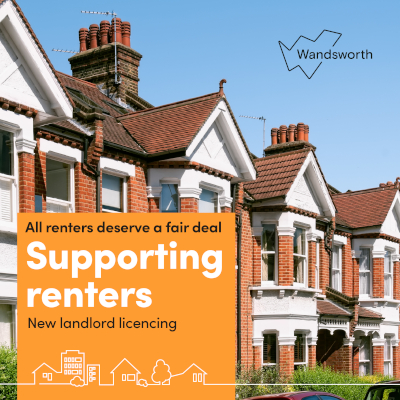Landlord responsibilities
As a landlord you must:
- Keep your rented properties safe and free from health hazards
- Make sure all gas and electrical equipment is safely installed and maintained
- Provide an Energy Performance Certificate for the property
- Protect your tenant’s deposit in a government-approved scheme
- Check your tenant has the right to rent your property if it’s in England
- Give your tenant a copy of the how to rent checklist when they start renting from you (you can email it to them)
You can find information about the rights and responsibilities of landlords on the GOV.UK website. The information includes:
As a landlord you are responsible to ensure you have a licence if your property requires one. Currently, licences are required for houses in multiple occupation (HMO). Find out more about landlord licences.
Health and safety inspections
The Housing Health and Safety Rating System (HHSRS) is used by us to make sure that properties are safe for the people who live there. This involves inspecting your property for possible hazards, eg uneven stairs. If you own a property and rent it out, the council may decide to do an HHSRS inspection because:
- Your tenants have asked for an inspection
- We have done a survey of local properties and think your property might be hazardous
You must take action on enforcement notices. You also have the right to appeal enforcement notices.
If we find a serious hazard we may:
- Issue an improvement notice
- Fix the hazard and bill you for the cost
- Stop you or anyone else from using part or all of the property
Fire, gas and electrical safety
Minimum Energy Efficiency Standard (MEES) Regulations
The MEES Regulations set a minimum energy efficiency level for domestic private rented properties. If you own and rent out a domestic property, it must have an energy performance certificate (EPC) with a rating of E or above, unless it is exempted.
It is illegal to rent out a domestic property with an EPC rating of F or G, unless a valid exemption is in place.
The MEES regulations are designed to:
- Make privately rented properties more energy efficient
- Improve the wellbeing and health of tenants
- Reduce carbon emissions
- Reduce bills and fuel poverty
If your property's EPC rating is F or G
If you are planning to let out a property or are currently letting a property with an EPC rating of F or G, you need to improve the property's rating to an E immediately or register an exemption.
Failure to make the property compliant or register an exemption can result in a financial penalty of up to £5,000 per property being imposed.
Register an exemption
The following exemptions are available:
- High cost exemption
- All improvements made exemption
- Wall insulated exemption
- Consent exemption
- Devaluation exemption
- New landlord exemption
Exemptions are all valid for five years, apart from the new landlord exemption which is valid for six months from the date of becoming a landlord.
On GOV.UK you can:
- Register for an exemption
- Read guidance about complying with MEES
Find an EPC
EPCs are currently only valid for 10 years. Find an energy certificate for a property (GOV.UK).
Support and advice
- Find ways to save energy in your home (GOV.UK)
- Apply for the Warm Homes: Local Grant (GOV.UK)
- Apply for the Great British Insulation Scheme (GOV.UK)
- Apply for the Boiler Upgrade Scheme (GOV.UK)
- Help from your energy supplier: the Energy Company Obligation (GOV.UK)
- Getting started with retrofit
Financial responsibilities
You have to pay:
- Income Tax on your rental income, minus your day-to-day running expenses
- Class 2 National Insurance if the work you do renting out property counts as running a business
If you have a mortgage on the property you want to rent out, you must get permission from your mortgage lender.
Regulated tenancies
There are special rules for changing rents and terms for regulated tenancies (usually private tenancies starting before 15 January 1989).
Checking the immigration status of tenants
From February 2016, if you let private rented accommodation to a new tenant, you must check that their immigration status is lawful before allowing them to rent the property. You may face a fine if you don’t comply.
